SCERT AP 7th Class English Textbook Answers 4th Lesson The Brave Little Bowman Textbook Questions and Answers.
AP State Syllabus 7th Class English Unit 4 Questions and Answers The Brave Little Bowman
7th Class English Unit 4 The Brave Little Bowman Textbook Questions and Answers
Look at the picture below and answer the questions that follow.
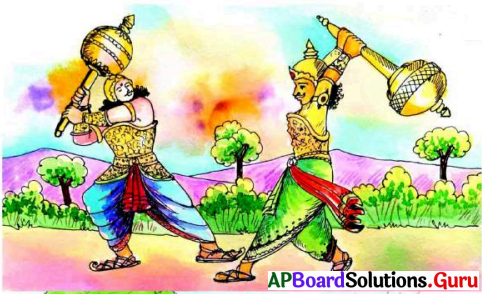
Question 1.
What are the men doing?
Answer:
The men are fighting.
Question 2.
What weapons are they using?
Answer:
The men are using maces (gadha) to fight.
Question 3.
Where do we see such fight scenes?
Answer:
We see such fight scenes in wars during the times of kings.
Question 4.
Can you name soma world famous personalities from any field?
Answer:
Yes, I can name some world famous personalities. For example, Virat Kohli from cricket, Kalam from science and technology, Narendra Modi from politics, P.V.Sindhu from tennis.
![]()
Question 5.
Is it their appearance/skill that makes them great personalities?
Answer:
It is their skill that makes them great.
Questions Given In The Lesson
Possible answers to the questions given in the middle of the lesson :
Question 1.
Do you know the success story of Sudha Chandran? Discuss.
Answer:
Yes, I know the success story of Sudha Chandran. She is an Indian film actor and a famous Bharatanatyam dancer. She overcame her disability of losing her right leg in an accident and danced again with great courage and determination.
Question 2.
Collect the names of such personalities and share with your friends.
Answer:
Albert Einstein, Stephen Hawking, George Washington, Helen Keller, Franklin D.Roosevelt, Ludwig Van Beethoven, Nik Vujicic, Rowan Atkinson, Walt Disney are some of the successful personalities with disabilities. They proved that their disability couldn’t stop them from achieving their goals.
Question 3.
Can the big man win the battle ? Substantiate your answer.
Answer:
I think the big man can’t win the battle as he is not a skilled warrior.
Question 4.
Will the little man support the big man?
Answer:
Yes, the little man will support the big man.
Reading Comprehension
A. Answer the following questions.
Question 1.
Why didn’t the little bowman go to the king and ask for a job in the army?
Answer:
The little bowman was afraid that the king would reject him as he was short and had a crooked back.
Question 2.
What did the little bowman tell the big man to do when he saw him digging ditches?
Answer:
The bowman approached him and said, “The days of your misery are over! You will immediately be recruited in the army because of your physique and you can then introduce me to them as your assistant. I will do the work that you will be given to do and we shall divide the pay between’us. This way both of us will be able to live comfortably.”
Question 3.
How did the big man introduce the little man to the king?
Answer:
The big man introduced the little man to the king as his assistant.
Question 4.
Did the big man kill the tiger and the wild elephant? Who killed them?
Answer:
No, the big man did not kill the tiger and the wild elephant. The little bowman killed them with his skill in archery.
![]()
Question 5.
If you were the big man, what would you do in the battlefield?
Answer:
If I were the big man, I would not leave the battlefield. As I knew the skill of the little bowman in archery, I would stay on the elephant and finish the battle.
Question 6.
Did the running away of the big man from the battlefield benefit the little man? How?
Answer:
The running away of the big man from the battlefield benefited the little man undoubtedly. The little man got a change to prove his skill and power. He was recognized by the king and received the much-deserved honour at last.
B. Put the following sentences in the order of events.
The big man and the little man joined the king’s army.
The little man told the big man to ask the king to let him join the army.
The little man saw a big strong man digging a ditch.
The big man slipped off the war elephant’s back and ran off into the city.
The little man killed the tiger and the wild elephant.
Answer:
The big man and the little man joined the king’s army. (3)
The little man told the big man to ask the king to let him join the army. (2)
The little man saw a big strong man digging a ditch. (1)
The big man slipped off the war elephant’s back and ran off into the city. (5)
The little man killed the tiger and the wild elephant. (4)
C. Say whether the following statements are True or False.
1. The little bowman introduced the big man as his assistant to the king.
2. The little man killed the tiger arid the wild elephant.
3. The big man asked the king to pay him five hundred pieces a month.
4. The little bowman led the elephant into the battle and won the battle.
5. The king made the little bowman the chief of his army and gave him rich gifts
Answer:
- False
- True
- False
- True
- True
Correct the false statements and write them here.
1. The big man introduced the little bowman as his assistant to the king.
3. The king told the big man that he would give a thousand silver coins a month.
Vocabulary
A. Crossword Puzzle
Fill the puzzle using the clues given below.
Across
1. an archer
3. sudden uncontrollable fear or anxiety
5. unkind, severe
6. having knowledge or ability
2. a brave soldier
3. express warm approval or admiration .
4. bent or twisted out of shape
7. a narrow channel dug at the side of the road or field
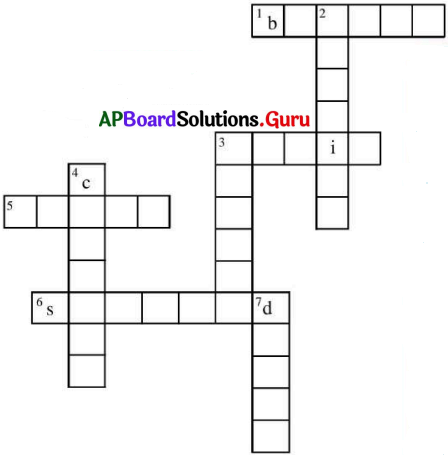
Answer:
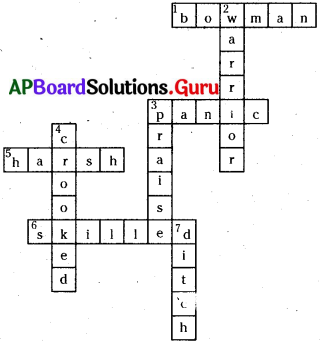
B. Observe how the past and past participle forms of the verbs are formed in set I and set II.
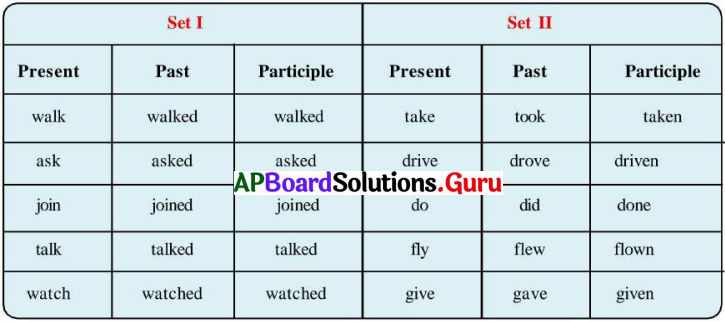
Note:
Verbs such as walk, ask, join, etc, which you find in set I are Regular Verbs.
Verbs such as take, drive, give, etc, which you find in set II are Irregular Verbs.
Pick out the verbs from the lesson, and write the V2 (past) and V3 (past participle) forms and place them under proper headings.
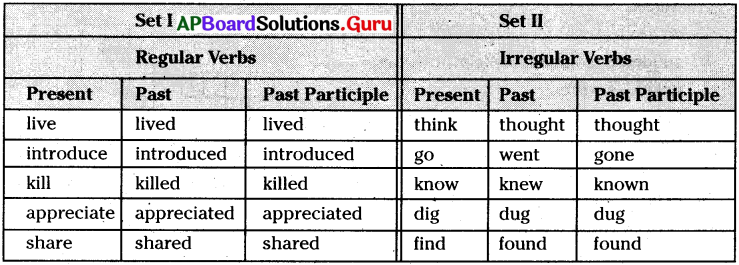
C. Find the ‘antonyms / opposites’ for the given words from the reading text.
- unarmed
- foolish
- unskilled
- relaxed
- coward
- separate
- gentle
- proud
- straight
- dismount
Antonyms:
- unarmed × armed
- foolish × wise
- unskilled × skilled
- relaxed × disturbed
- coward × brave
- separate × join
- gentle × harsh
- proud × humble
- straight × crooked
- dismount × mount
![]()
D. Fill in the blanks with the opposite of the word underlined.
1. Never speak harshly, always speak _________ .
2. Cruelty towards animals is a sin. We should show _________ to animals.
3. Everybody likes to be praised. Nobody likes to be _________ .
4. I am glad I got the job, but _________ on leaving my home town.
5. David told his timid young brother to be _________ .
Answer:
- Never speak harshly, always speak kindly.
- Cruelty towards animals is a sin. We should show kindness to animals.
- Everybody likes to be praised. Nobody likes to be blamed.
- I am glad I got the job, but sad on leaving my home town.
- David told his timid ybimg brother to be brave.
Grammar
Read the following sentences from the reading text.
- The king will take both of us.
- We will go to the king and ask for a job.
- Will you come with me?
These sentences are in the simple future tense.
Pick out some more sentences which are in the simple future tense from the reading text and write them here. .
1. ___________
2. ___________
3. ___________
4. ___________
5. ___________
6. ___________
Answer:
1. I will do the work assigned to you and we will divide the pay equally.
2. Okay, 1 will go with you.
3. I will take the both of you and give a thousand silver coins a month.
4. We will serve you to the best of our abilities.
5. Will you do it?
6. I will kill the tiger.
7. I will sit behind you on the war elephant and shoot with my bow and arrow.
8. I will fight for the king.
You have already learnt the structure and usage of simple future tense. Now, do the following exercise.
A. Here is how Karim, John and Indu plan their summer holidays.
Fill the blanks with suitable form of verb given in brackets.
1. Hello, I am Karim. Every summer we _______ (go) to Chennai to visit my grandparents. But this summer, we _______ (not visit) them. We _______ (go) on a tour to Singapore. We _______ (do) a lot of shopping there. We _______ (visit) all the sight-seeing places in Singapore. We _______ (stay) there for ten days.
Answer:
Hello, I am Karim. Every summer we go to Chennai to visit my grandparent But this summer, we will not visit them. We will go on a tour to Singapore. We will d0 of shopping there. We will visit all the sight-seeing places in Singapore. We will stay there for ten days.
2. Hello, 1 am John. This summer ______ (go) camping with my classmates and we ______ (climb) up trees. We ______ (make) campfires and ______ (sleep) in tents. But it ______ (last) only for a week. Then, like every summer. I ______ (read) books and ______ (watch) TV at home.
Answer:
Hello, I am John. This summer I will go camping with my classmates and we will climb up trees. We will make campfires and will sleep in tents. But it will last only for a week. Then, like every summer I will read books and will watch TV at home.
3. Hi, I am Indu. Every summer we ______ (go) to my grandpa’s village. He has a lovely farm. This summer too, we ______ (go) there. I ______ (ride) a horse. I ______ (climb) trees and ______ (go) fishing and (pick) up flowers also. I ______ (feed) the lovely animals.
Answer:
Hi, 1 am Indu. Every summer we go to my grandpa’s village. He has a lovely farm. This summer too, we will go there. I will ride a horse. I will climb trees and will go fishing and pick up flowers also. I will feed the lovely animals.
B. Fill the blanks with the verb in simple future tense. (One is done for you)
Ex : He ______ (come) tomorrow.
A. He will come tomorrow. ‘
1. Karim ______ (travel) around Europe next year.
2. The exams ______ (be) in June.
3. The students ______ (finish) the English project in two days.
4. He ______ (call) me tomorrow afternoon.
5. I ______ (get) you something to drink.
Answer:
1. Karim will travel around Europe next year. .
2. The exams will be in June.
3. The students will finish the English project in two days.
4. He will call me tomorrow afternoon.
5. I will get you something to drink.
![]()
C. Write negative sentences for the given positive sentences. (One is done for you.)
Ex : They will go shopping on Saturday.
A. They will not go shopping on Saturday.
1. My mother will assign work to me.
Answer:
My mother will not assign work to me.
2. He will get the job.
Answer:
He will not get the job.
3. We shall buy another house.
Answer:
We shall not buy another house.
4. The doctor will see you very soon.
Answer:
The doctor will not see you very soon.
5. He will leave tomorrow.
Answer:
He will not leave tomorrow.
D. Framing questions that take Yes/No responses
Read the following sentences from the story.
Little Man : Can’t you find some other work?
Big Man : No, I can’t.
The King : Have you heard about the wild elephant?
Big Man : Yes, your Majesty.
The King : You must go to the forest and kill the tiger. Will you do it?
Big Man : Yes, your Majesty! I will kill the tiger.
Look at the answers to the above questions. Those answers begin with either YES or NO.
The above questions begin with words can, have, will, did etc. (The Auxiliary Verbs). Now let us see how these questions are framed.
1. Observe the position of the auxiliary verb in the statement and the question.
| Statement | Question |
| 1. She is learning classical dance. | Is she learning classical dance? |
| 2. They were playing chess. | Were they playing chess? |
| 3. He will finish the project in time. | Will he finish the project in time? |
| 4. We can enjoy the movie. | Can we enjoy the movie? |
| 5. I should write the examination. | Should I write the examination? |
Now, frame questions to the given statements. (One is done for you)
1. He was a skilled archer.
Answer:
Was he a skilled archer?
2. The king will take both of them.
Answer:
Will the king take both of them?
3. I am not a skilled warrior.
Answer:
Am I not a skilled warrior?
4. She is preparing dinner for us.
Answer:
Is she preparing dinner for us?
5. The little girl can tell the names of all Indian Presidents.
Answer:
Can the little girl tell the names of all Indian Presidents?
6. My friends are going on an excursion.
Answer:
Are my friends going on an excursion?
7. They were building a house by this time last year.
Answer:
Were they building a house by this time last year?
8. I should attend the meeting.
Answer:
Should I attend the meeting?
9. We shall take up the challenge.
Answer:
Shall we take up the challenge?
10. The Prime Minister has declared the lockdown.
Answer:
Has the Prime Minister declared the lockdown?
![]()
2. Observe the following Statements and Questions.
| Statement | Yes / No Question |
| Birds fly in the air. | Do birds fly in the air? |
| A cow gives us milk. | Does a cow give us milk? |
| He got top rank in the examination. | Did he get top rank in the examination? |
Now, frame questions for the given statements: (One is done for you)
1. The rainbow appears in the sky.
Answer:
Does the rainbow appear in the sky?
2. The Sun rises in the east.
Answer:
Does the Sun rise in the east?
3. Trees give us fruits.
Answer:
Do trees give us fruits?
4. He wrote a novel.
Answer:
Did he write a novel?
5. She sang a song on the dais.
Answer:
Did she sing a song on the dais?
Writing
A. In the story the big man was appreciated for killing the tiger and the wild elephant. He started ignoring the little bowman. Describe the feelings of the little bowman in this context.
Make use of the following hints.
Unlucky I am – with my skill – killed the tiger – killed the wild elephant – but credit went to the big man – the king and the people praised him — I was ignored – really unfortunate – what can I do now? – can I reveal the truth — may the king punish us – better to keep quiet.
Answer:
How unlucky I am! I killed the tiger and the wild elephant with my skill. But the credit went to the big man. I did not get any recognition. The king and the people praised him but I was ignored. It is really unfortunate. What can I do now? Can I reveal the truth? The king may punish us if I reveal the truth. So it is better to keep quiet.
B. You have read the lesson ‘The Brave Little Bowman’. Rewrite it in the form a story.
Answer:
Once upon a time, there lived a bowman. He was a skillful archer in a city. Though he was short in height and had a crooked back, none could beat him in archery. One day he thought, “ I am good enough to join the king’s army, but he would never take me in because of my short stature and hunched back. I must look for someone tall and pow¬erful, and then I can enter the king’s army as his page.”
One day, the little bowman found the kind of man he was Iooking for. He was a tall and powerful man and used to dig ditches to earn his living. The bowman approached him and said, “The days of your misery are over! 1 am the best archer of this country and worthy of being a part of the king’s royal army. But, I may get rejected because of my height and crooked back. So, I need your help. You will immediately be recruited in the, army because of your physique and you can then introduce me to them as your assistant. I will do the work that you will be given to vdo and we shall divide the pay between us. This way both of us wili be able to live comfortably.”
The tall man gladly agreed. Together they reached the king’s palace and sent word to the king that a famous bowman was there to meet him. The king met the bowman and being impressed by his towering personality, joined him in the royal army. The little man’s dream had come true. He was now a part of the royal army, though disguised as the assistant of the big man.
In those days, there was a man-eater tiger on the loose in the jungle. The king sent for the big man and ordered him to kill the tiger. The big man told the little bowman what the king had said. They went to the forest together and soon, the little bowman shot the tiger dead. The king was extremely impressed by the heroic act of the big man and rewarded him with expensive gifts.
Some days, later, a wild elephant came on the city roads and started killing the people. The big man was asked to go and kill the elephant. The big man carried the little bowman on his shoulders and as always, the little bowman hit his target and killed the elephant.The king was full of praise for the big man and gave him a reward. The big man started treating the little man as his servant and spoke him Very rudely. The little bowmah was very sad.
A few days later, the king of the neighbouring country attacked the kingdom. The king at once sent his army. The big man was mounted on a majestic elephant and was wearing shining armour. The little bowman knew that the big man could not shoot, so he also took his bow and arrow and quietly sat behind the big man on the elephant.
When the big man saw a huge enemy army in front of him, he started to shake with fear. The little bowman asked him to keep sitting quietly, but the big man was so nervous that he jumped off the elephant and ran back to the city from the battle-field.
The little bowman led the elephant fearlessly into the battle-field and killed many of the enemies with his unmistakable shots. All the soldiers were motivated by the little man’s act of bravery and they soon forced the enemy army to withdraw, itself. The king now understood that it was the little bowman who was the real hero. He made ‘ him the chief of his army andalso rewarded him with rich gifts.
Talking Time
Language Function : Offering and asking for help:
Read the-following conversation between Gowtham and Sudha. Work in pairs.
Gowtham : Hello ! Sudha. What will you do tomorrow?
Sudha : I’ll work on my English project.
Gowtham : Shall I help you to complete your project work?
Sudha : I’ll be glad if you can.
Gowtham : Certainly, Sudha.
Sudha : Thank you very much.
Here are some examples for asking for help / offering help :
| Asking for help | Offering help |
| Could you help me ………….. Would you mind ………….. Can you do me a small favour,.. Please ………….. Can you please lend me ………….. |
Can/May I help ………….. Would you like me to help you…. I will help you ………….. If you need any help, let me know…. Do you want me to help you ………….. |
Frame sentences to make offers using the words given and practice.
1) Cook the dinner (Shall) ___________________
2) Clean the floor (Can) ___________________
3) Cup of coffee (Would) ___________________
4) Do the shopping (Will) ___________________
5) Make some sandwiches (Would) ___________________
Answer:
Making Offers:
- Shall I cook dinner for you?
- Can I clean the floor?
- Would you like me to give you a cup of coffee?
- Would you like me to make some sandwiches for you?
Asking for Help:
- Can you clean the floor for me?
- Will you do’shopping for me?
- Would you mind making some sandwiches for me?
Listening
Listen to the story and answer the questions that follow.
AN AUDACIOUS VILLAGE
Every country is protected by the armed forces like the army, the navy and the air force. If one wants to join the armed forces, one needs bravery and patriotism. You may have many professionals like engineers, doctors, lawyers, teachers, etc., in your locality. However it is rare to find people who work in the army from your area.
Madhavaram, called Military Madhavaram in West Godayari District, which is famous for sending men to serve in the armed services for centuries. Almost every household in the small village has at least one member serving in the armed forces.
During colonial rule, youth from the village flocked to the military and participated in major wars. Nearly 90 soldiers from this remote village participated in World War I and the figure rose up to 1,110 in World War II. Many soldiers from this village have laid down their lives.
Soldiers from the village have been a part of every war that independent India has fought. Many soldiers from this village sacrifice and guard the Indian frontiers. The girls in the village prefer to marry military men. The villagers, to commemorate the sacrifice and services of the soldiers, built a memorial for soldiers on the lines of New Delhi’s Amar Jawan. For many years, joining the Indian Armed Forces has remained the career of choice for the young men of the village.
Answer the following questions :
1. What qualities are required to join the Armed forces?
Answer:
Bravery and patriotism .
2. Whom do the girls in the village prefer to marry?
Answer:
Military men
3. How did the villagers commemorate the sacrifice made by the soldiers?
Answer:
By building memorials for soldiers on the lines of New Delhi’s Amar Jawan
4. How many World Wars are mentioned in the story?
Answer:
Two
5. What is Amar Jawan famous for?
Answer:
It is famous for building memorials for soldiers.
Study Skill
A. Study the following pie-chart and answer the questions that follow.

1. What is the pie chart about?
Answer:
The pie chart is about the recommended diet.
2. What is the percentage of vegetables in the diet recommended?
Answer:
18%
3. _______ occupied 9% of the diet recommended.
a) Vegetables
b) Grains
c) Other
Answer:
b) Grains
4. Which item occupies the highest percentage of our diet?
a) Protein
b) Fruit
c) Vegetables
(Note : The question is wrongly given in textbook. Hence, it has been changed for the convenience of students.)
Answer:
b) Fruit
5. Identify the true/false statement.
a) The percentage of fruit in our diet is 23%. (false)
b) Grains occupy the least perccentage of our diet. (false)
c) Vegetables occupy 18% share of our diet. (true)
B. Dictionary Entry
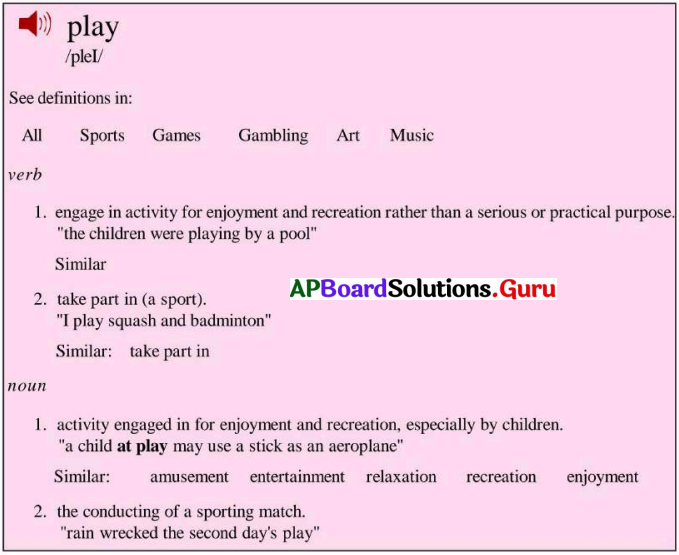
Fun Time
Look at the word ‘make’. By replacing the underlined letter ‘k’ in the word with r, l and t we can make new words like ‘mare, male, mate’ and so on. Now make at least three new words by replacing the letter underlined with any letter of your choice.
make – mare male mate
1) same – _______
2) poke – _______
3) robe – _______
4) sail – _______
5) bake – _______
Answer:
- safe, sage, sake, sale, same, sane, sate, save
- pole, pone, pope, pore, pose
- rode, role, Rome, rope, rose, rote, rove
- bail, fail, hail, jail, mail, nail, pail, rail,.sail, tail, vail, wail
- babe, bade, bale, bane, bare, base
Riddles:
Here are some riddles for you to solve. (One is done for you.)
Ex. I am tall when I am young and 1 am short when I am old. What am I?
A. Candle
1) You walk into a room that contains a candle, a kerosene lamp, a match and a fireplace. What would you light first?
2) A man dies of old age on his 25th birthday. How is this possible?
3) What has many keys but can’t open, a single lock?
4) What is black when it is clean and white when it is dirty?
5) Where does today come before yesterday?
Answer:
1) A match
2) The man’s birthday falls on February 29.
(Or)
The man was born on February 29.
3) A piano
4) A blackboard
5) In the dictionary entries
Tongue Twisters:
Say them aloud.
- Troubles never troubled Trouble, as he himself troubled troubles.
Mine collected fine and wished to have wine but the shopkeeper closed at nine for fear of fine.
Bumble often mumbles something to Rumble but the latter does not catch the matter as nothing matters to him.
Mr. Will, prepared a will as he willed to inherit his paper mill to his daughter, Jill.
Ms. Sind wound the bandage round the wound and soon unwound it as it was not wound properly around the wound.
The Brave Little Bowman Summary
Once upon a time, there lived a skillful archer in a city. Though he was short in ‘ height and had a crooked back, none could beat him in archery. One day he thought, “I am good enough to join the king’s army, but he would never take ine in because of my short stature and hunched back. I must look for someone tall and powerful, and then I can enter the king’s army as his .page.”
One day, the little bowman found the kind of man he was looking for. He “was a tall and powerful man and used to dig ditches to earn his living. The bowman approached him and said, “The days of your misery are over! I am the best archer of this country and worthy of being a part of the king’s royal army. But, I may get rejected because of my height and crooked back. So, 1 need your help. You will immediately be recruited in the army because of your physique and you can then introduce me to them as your assistant. I will do the work that you will be given to do and we shall divide the pay between us. This way both of us will be able to live comfortably.”
The tall man gladly agreed. Together-they reached the king’s palace and sent word to the king that a famous bowman was there to meet him. The, king met the bowman and being impressed by his towering personality, joined him in the royal army. The little man’s dream had come true. He was now a part of the royal army, though disguised as the assistant of the big man.
In those days, there was a man-eater tiger on the loose in the jungle. The king sent for the big man and ordered him to kill the tiger. The big man told the little bowman what the king had said. They went to the forest together and soon, the little bowman shot the tiger dead. The king was extremely impressed by the heroic act of the big man and rewarded him with expensive gifts.
Some days, later, a wild elephant came on the city roads and started killing the people. The big man was asked to go and kill the elephant. The big man carried the little bowman on his shoulders and as always, the little bowman hit his target and killed the elephant. The king was full of praise for the big man and gave him a reward. The big man started treating the little man as his servant and spoke him very rudely. The little bowman was very sad.
A few days later, the king of the neighbouring country attacked the kingdom. The king at once &ent his army. The big man was mounted on a majestic elephant and was wearing shining armour. The little bowman knew that the big man could not shoot, so he also took his bow and arrow and quietly sat behind the big man on the elephant.
When the big man saw a huge enemy army in front of him, he started to shake with fear. The little bowman asked him to keep sitting quietly, but the big man was so nervous that he jumped off the elephant and ran back to the city from the battle-field.
The little bowman led the elephant fearlessly into the battle-field and killed many of the enemies with his unmistakable shots. All the soldiers were motivated by the little man’s act of bravery and they soon forced the enemy army to withdraw itself. The king now understood that it was the little bowman who was the read hero. He made him the chief of his army and also rewarded him with rich gifts.
Meanings For Difficult Worps
crooked (adj) : bent,or twisted out of shape
ditch (n) : a narrow channel dug at the side of the road or field, to carry away water
earn a living (idiom) : to earn money needed for food and clothing
praise (v) : express warm approval or admiration
harsh (adj) : unkind, severe
bowman (n) : an archer
Your Majesty! (phrase) : the title used to speak to a king (Respected great king)
Your Highness! (phrase) : the title used to speak to a king (Respected great king)
mounted (adj) : riding an animal, typically a horse
warrior (n) : a brave or experienced soldier or fighter
skilled (adj) : having or showing the knowledge or ability
panic (n) : sudden uncontrollable fear or anxiety
put fear to rest (phrase) : to calm one’s fear
gave a cold shoulder (phrase) : tread in an unfriendly way
a bolt from the blue (phrase) : a sudden unexpected news
armed (adj) : carrying weapons to fight
A Fairy Song Poem
Over hill, over dale,
Thorough bush, thorough brier,
Over park, over pale,
Thorough flood, thorough fire !
I do wander everywhere,
Swifter than the moon’s sphere;
And I serve the Fairy Queen,
To dew her orbs upon the green;
The cowslips tall her pensioners be;
In their gold coats spots you see;
Those be rubies, fairy favours;
In those freckles live their savours;
I must go seek some dewdrops here,
And hang a pearl in every cowslip’s ear. -By William Shakespeare
Appreciation of the Poem
A. Choose the correct options to complete the sentences.
1. The fairy wanders _________
a) over the dale
b) over the hill
c) everywhere
Answer:
c) everywhere
2. The fairy is serving the Fairy Queen by dropping upon the green.
a) dewdrops
b) cowslips
c) rubies
Answer:
a) dewdrops
3. The fairy walks faster than the rotation of the
a) Fairy Queen
b) dewdrops
c) Moon
Answer:
c) Moon
4. The fairy wants to hang a in every cowslip’s ear.
a) dewdrops
b) ruby
c) pearl
Answer:
c) pearl
5. Who are the fairy queen’s pensioners?
a) cowslips
b) dew drops
c) orbs
Answer:
a) cowslips
![]()
B. Answer the following questions :
1. Where does the fairy wander?
Answer:
The fairy wanders over hills, dales, parks and pales and through bushes, briers, floods and fire.
2. How quickly does the fairy wander?
Answer:
He wanders faster than the moon.
3. Who does the fairy serve?
Answer:
The fairy serves the Fairy Queen.
4. What are the spots on the cowslips compared with ?
Answer:
The sports on the cowslips are compared with rubies.
5. Identify and write the other rhyming words in the poem:.
( E.g. dale – pale)
Answer:
brier – fire where – sphere
queen – green be – see
favours – savours here- ear
Check Point
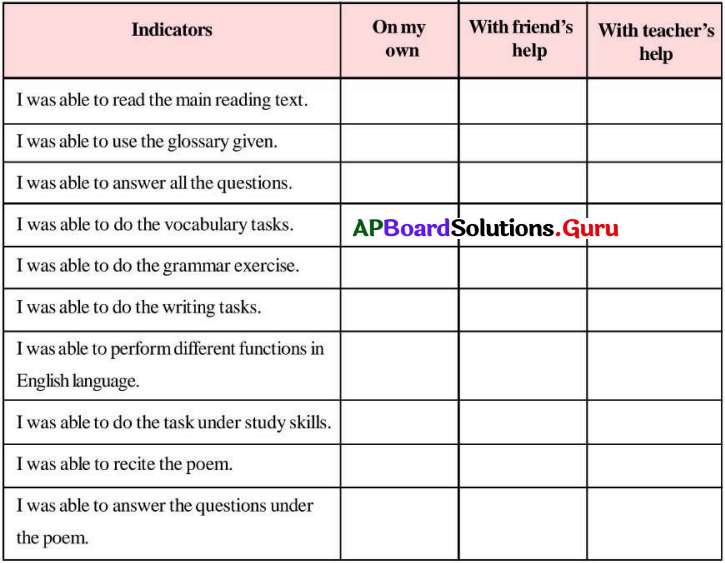
A Fairy Song Summary
The poem ‘A Fairy Song’, refers to a fairy that serves his/her fairy queen. He/She spreads the dew on the flower everywhere he/she crosses. He/She wanders many places to do this work like hills, pales and so on.
The fairy flies over hill and open river valleys, through bushes and prickly plants, above parks and fences, through floods and fire.
The fairy travels everywhere faster than the moon revolves around the earth. The fairy serves the Fairy Queen.
The fairy works for the fairy queen and must deliver dewdrops (orbs here refers to the spherical shape of the drops) on the greenery around. This includes delivering dewdrops to the cowslips – a yellow flower with tall slender stems. The cowslips are therefore indebted to the fairy queen and therefore become her pensioners.
In their yellow gold petals being referred to as coats… thus personifying it in a way, you can see spots. The spots are red in colour and therefore look like rubies. If you have seen a cowslip, you will notice it has red spots in the centre. The poet says this is possible because of the favour the fairy does to the cowslips by delivering dew to them. The red spots are compared to freckles that appear at the peak of a cowslip’s life.
The fairy finally says that he/she must look for more dewdrops that have been compared to pearls so that he/she can hang them in every cowslip’s ear. Again this is a personification where the cowslip is given a human quality of having an ear that can be fashioned with a pearl.
A Fairy Song About the Poet

William Shakespeare (1564 – 1616) was an English playwright, poet, and actor often called the English National Poet and consid¬ered by many to be the greatest dramatist of all time. He was nicknamed The Bard of Avon. Shakespeare’s works include 38 plays, 2 narrative poems, and 154 sonnets and a variety of other poems. His plays like Hamlet, Macbeth, King Lear are some of the finest works in those genres. Some of his works are studied as academic subjects at postgraduate level across the world. This poem (A Fairy Song) is
Meanings For Difficult Words
dale (n) : an open river valley (in a hilly area)
thorough (prep.) : old spelling of ‘through’
brier (n) : tangled mass of prickly plants / a thorny plant
pale (n) : a wooden strip forming part of a fence
wander (v) : move about aimlessly or without any destination, often in search of food or employment
swifter (adj) : faster
sphere (n) : range / ball / area
to dew her orbs (phr.) : In this poem, dew has been used as a verb which could mean to place ‘tiny drops (orbs) of water that form on cool surfaces at night, when atmospheric vapor condenses’
cowslips (n) : The cowslip is a yellow flower belonging to the primrose family. Its name comes from old English for cow dung, perhaps because the plant commonly grew amongst the manure in cow pastures.
pensioners (n) : followers/dependants
rubies (n) : red gemstones
favours (v) : to treat somebody better than you treat other people
freckles (n) : a small brownish spots (of the pigment melanin) on the skin
savours (v) : get enjoyment from; take pleasure in
dewdrops (n) : drops of dew
![]()
Language Devices in the Poem :
Hyperbole : Line 4 & Line 6
→ Thorough flood, thorough fire!
→ Swifter than the moon’s sphere
Personification : Line 14
And hang a pearl in every cowslip’s ear
Simile : Line 6
The writer uses connective word ‘than’ in this line. The poet is comparing ‘swifter’ to the moon’s sphere.
→ Swifter than the moon’s sphere